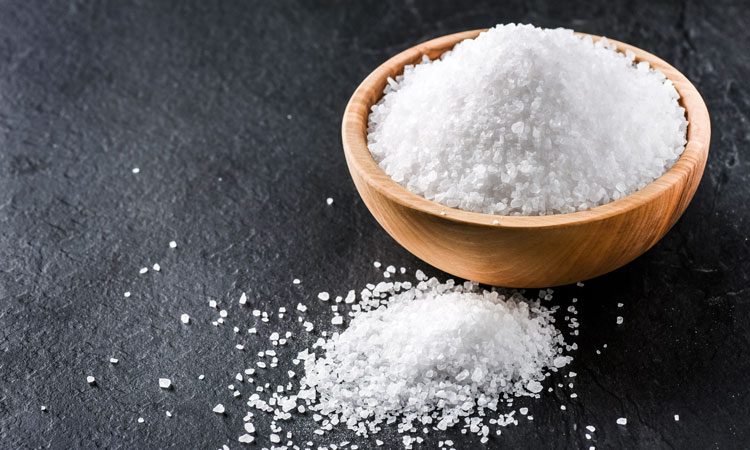Salt switch reduces chance of stroke, says new research
- Like
- Digg
- Del
- Tumblr
- VKontakte
- Buffer
- Love This
- Odnoklassniki
- Meneame
- Blogger
- Amazon
- Yahoo Mail
- Gmail
- AOL
- Newsvine
- HackerNews
- Evernote
- MySpace
- Mail.ru
- Viadeo
- Line
- Comments
- Yummly
- SMS
- Viber
- Telegram
- Subscribe
- Skype
- Facebook Messenger
- Kakao
- LiveJournal
- Yammer
- Edgar
- Fintel
- Mix
- Instapaper
- Copy Link
Posted: 31 August 2021 | New Food Magazine | No comments yet
Replacing salt with a low-sodium alternative reduced the chance of stroke and other major cardiovascular events among participating communities in China.


Replacing salt with a low-sodium alternative lowers the risk of stroke in people with high blood pressure or prior stroke, according to new research published in the New England Journal of Medicine.
Both elevated sodium intake and low potassium intake are associated with high blood pressure and an increased risk of cardiovascular disease and premature death.1 2 Salt substitutes, which replace part of the sodium chloride in regular salt with potassium chloride, have been shown to lower blood pressure3 but their effects on heart disease, stroke, and death had been uncertain. In addition, there had been concerns about causing hyperkalaemia in people with chronic kidney disease leading to cardiac arrhythmias and sudden death.
The Salt Substitute and Stroke Study (SSaSS) compared the effect of reduced sodium salt substitute versus regular salt on stroke, cardiovascular events, mortality and clinical hyperkalaemia.4 SSaSS was an open, cluster-randomised, trial that enrolled participants between April 2014 and January 2015. Participants were adults with either previous stroke or age 60 years and above with poorly controlled blood pressure.7
The trial was conducted in 600 villages in rural areas of five provinces in China. Two counties within each province were chosen that represented the socioeconomic development level of rural counties in that province. Approximately 35 individuals were recruited from each village – for a total of 20,995 participants. The researchers say participants were cluster-randomised by village in a 1:1 ratio to provision of salt substitute or continued use of regular salt.
Participants in intervention villages were given free salt substitute (about 75 percent sodium chloride and 25 percent potassium chloride) as a replacement for regular salt and advised to use it for all cooking, seasoning and food preservation. They were also encouraged to use the salt replacement more sparingly than they previously used salt to maximise their sodium reduction.
The average age of participants was 65.4 years and 49.5 percent were female. Some 72.6 percent had a history of stroke and 88.4 percent had a history of hypertension, according to the research team.
During an average follow up of 4.74 years, more than 3,000 people had a stroke, more than 4,000 died and more than 5,000 had a major cardiovascular event. The risk of stroke was reduced with salt substitute compared to regular salt (29.14 versus 33.65 per 1,000 patient-years), while secondary outcomes, such as major cardiovascular events (non-fatal stroke, non-fatal acute coronary syndrome, vascular death) were also reduced (49.09 versus 56.29 per 1,000 patient-years).
“This study provides clear evidence about an intervention that could be taken up very quickly at very low cost. A recent modelling study done for China projected that 365,000 strokes and 461,000 premature deaths could be avoided each year in China if salt substitute was proved to be effective.8 We have now showed that it is effective, and these are the benefits for China alone. Salt substitution could be used by billions more with even greater benefits,” said principal investigator Professor Bruce Neal of the George Institute for Global Health, Sydney, Australia.
“The trial result is particularly exciting because salt substitution is one of the few practical ways of achieving changes in the salt people eat. Other salt reduction interventions have struggled to achieve large and sustained impact.’’
References
- Cogswell ME, Mugavero K, Bowman BA, Frieden TR. Dietary sodium and cardiovascular disease risk–measurement matters. N Engl J Med. 2016;375:580–586.
- Aburto NJ, Hanson S, Gutierrez H, et al. Effect of increased potassium intake on cardiovascular risk factors and disease: systematic review and meta-analyses. 2013;346:f1378.
- Greer RC, Marklund M, Anderson CAM, et al. Potassium-enriched salt substitutes as a means to lower blood pressure. 2020;75:266–274.
- Neal B, Tian M, Li N, et al. Rationale, design, and baseline characteristics of the Salt Substitute and Stroke Study (SSaSS)-A large-scale cluster randomized controlled trial. Am Heart J. 2017;188:109–117.
Related topics
Health & Nutrition, Ingredients, Research & development, Salt, The consumer








